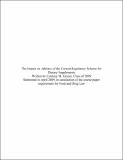| dc.contributor.advisor | Peter Hutt | en_US |
| dc.contributor.author | Kruzer, Lyndsey | |
| dc.date.accessioned | 2012-06-03T10:14:28Z | |
| dc.date.issued | 2009 | |
| dc.identifier.citation | Lyndsey Kruzer, The Impact on Athletes of the Current Regulatory Scheme for Dietary Supplements (April 2009). | en_US |
| dc.identifier.uri | http://nrs.harvard.edu/urn-3:HUL.InstRepos:8822179 | |
| dc.description.abstract | This paper uses the popularity of dietary supplements among athletes and the possibility that such athletes may unknowingly fail drug tests because of said supplements as a lens for examining some of the weaknesses caused by the FDA’s current limited authority over the supplement industry. After providing an outline of both the current state of the law with respect to dietary supplements and the regulations and liability to which athletes are subject, I emphasize the impact and potential consequences of widespread use and endorsement of dietary supplements by athletes. I then specifically address the possibility of surprise liability for supplement use and what this possibility reveals about the supplement industry, as a whole. Ultimately, I conclude that the FDA should regulate more tightly the supplement industry. Although the possibility of treating dietary supplements as drugs seems promising in many ways, I propose that, at least in the short term, the FD&C Act be amended to treat dietary supplements strictly as foods – without the exceptions brought about by DSHEA – in order to solve some of the current problems (and specifically the problem of surprise liability among athletes) caused by the loose regulation of the supplement industry. | en_US |
| dash.license | LAA | |
| dc.subject.other | Food and Drug Law | en_US |
| dc.title | The Impact on Athletes of the Current Regulatory Scheme for Dietary Supplements | en_US |
| dc.type | Paper (for course/seminar/workshop) | en_US |
| dc.date.available | 2012-06-03T10:14:28Z | |


